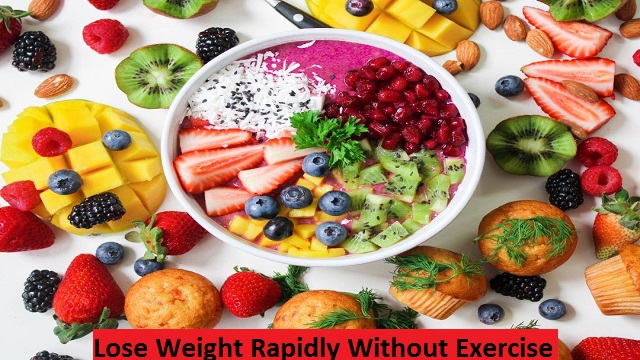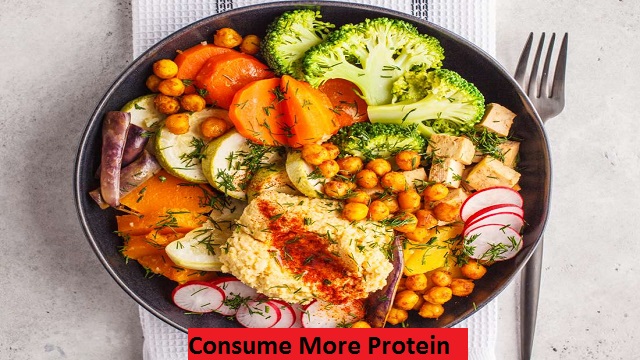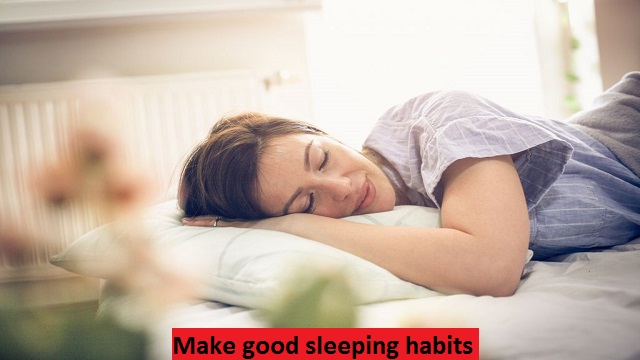
How To Lose Weight Rapidly Without Exercise?
You’ve come to the right place if your objective is to lose weight quickly. Nutrition, exercise, and supplementation are the three factors that will help you lose weight quickly. Yes, that’s what this article is all about—quick weight loss without exercise. But that does not imply that it is not significant. We’re going to discuss how to lose weight quickly and improve your nutrition in the most effective and efficient way possible.
Food For Losing Weight.
The most important component of any weight loss program is establishing healthy eating habits. When you put quality foods first and stop counting calories, you’ll be surprised at how much food you can consume. Simply put, exercise is insufficient to aid in weight loss on its own. In fact, you don’t even have to exercise in order to lose weight. Exercise will improve your ability to lose weight, hasten the process, and increase muscle mass. But what you eat is the most important factor in weight loss.
What Should I Consume in Calories to Lose Weight?
Creating a calorie deficit is the key to weight loss.Your basal metabolic rate, or BMR, must be calculated in order to determine how many calories you should consume daily in order to lose weight.
You can accurately predict how many calories you need to consume in order to maintain your weight, lose weight, or add more muscle mass by calculating your basal metabolic rate and total daily energy expenditure. You can determine how many calories to consume by using your BMR as a starting point.
Your body’s internal processes come together during metabolism. These include activities like converting the food you eat into energy, also known as calories, to power essential biological functions like breathing and movement. Metabolic rate is the frequency of these occurrences. Your total daily energy expenditure, or TDEE—the number of calories you burn each day—can be calculated once you know your BMR.
Stop dieting.
Long-term weight loss is not possible with diets like Keto and Atkins. It is unhealthy to consume a thick layer of fat that is topped with cream cheese, sour cream, and bacon. It is not necessary to be a licensed dietician to understand that.
Diets are restrictive and encourage you to consume less, but in order to lose weight, you actually need to eat more of the right foods. You can easily reduce your calorie intake by eating a balanced diet that is rich in quality carbs, lean proteins, and healthy vegetables.
Pay attention to eating wholesome foods rather than fast food.
“Eat” is the key word in this title. ”.
You should eat more high-quality lean meats, vegetables, healthy fats, and fruit if you want to lose weight quickly. Non-consistent eating and sporadic consumption of packaged foods containing simple carbohydrates, also known as refined sugars, are two of the biggest contributors to weight gain.

Consume more protein.
Protein aids in accelerating metabolism and, unlike simple carbohydrates, does not result in a spike in blood glucose levels, which serves as a catalyst for the accumulation of extra body fat. Include lean proteins like grass-fed beef, chicken, turkey, and fish. Start by consuming at least 0.9g of protein for every pound of body weight.
You must consume a minimum of 130g of protein daily if you weigh 145 pounds, according to this rule. 4 ounces of protein at each meal will give you about 100 grams, despite the fact that it may seem like a lot. If you need more protein, add a protein bar or a whey protein isolate shake to your diet, and you’ll meet your daily requirements.
Vegetables and protein go together well.
Vegetables are rich in complex carbohydrates and fiber. Complex carbohydrates keep you feeling fuller for longer because they are digested more gradually. Additionally, unlike simple carbohydrates, which raise blood sugar levels, complex carbohydrates release insulin much more gradually. Every meal should include a healthy carbohydrate and a protein. It has been demonstrated to aid people in losing weight quickly.
Take in more water.
Throughout the day, you can absorb water from food and beverages, but plain, room-temperature water is the best. You’ll lose weight more quickly even though it sounds boring. It has been demonstrated that drinking water helps to increase metabolism, flush out waste, and control appetite. We advise adding a few drops of lemon to the water and always traveling with a reusable water bottle.
In moderation, everything.
It doesn’t follow that you can’t indulge in a treat just because you’re trying to eat healthily. Treats and candy can have a negative impact on your health and appearance when they become a habit and a meal replacement. Choose some healthy candy substitutes instead of candy, or put some fresh fruit in your fridge so you can quickly grab a snack on the go.
Making meals.
By planning your meals ahead of time, you can make sure you consume more of the high-quality calories you need throughout the day to boost your energy levels and accelerate your weight loss. When you meal prep, it is always very simple to keep track of your food intake, which is essential to achieving better results more quickly. Utilize a food tracking app, such as My Fitness Pal.
You won’t be able to determine how much you’re eating or whether you’re making any progress without tracking.
You frequently gain weight when you let yourself become overly hungry and end up eating everything you see. If in doubt, prepare meals. It will protect you from the monster-sized food monster that needs to be avoided.
Watch What You Eat.
Nothing is managed that is not measured. You can’t get a true picture of where you started, where you are now, and how you got there if you aren’t tracking your food. You can easily keep track of what you eat, and it will speed up your weight loss. The ability to lose weight and keep it off is higher in those who track.

If you’re unsure, consult a nutrition coach.
Engage a certified nutrition coach if you have no idea where to begin, what to eat, or how to track your food and achieve the results you desire. Getting advice from a nutritionist is always a surefire way to lose weight quickly, or at least a lot quicker than you would on your own.
If you want to save yourself the hassle of having to learn from a number of mistakes along the way, you need a nutrition coach. They remove the element of guesswork, which increases the effectiveness and efficiency of your weight loss efforts. Not to mention, you’ll always have someone on your side.
Tips from the Experts for Safe Weight Loss.
If you want to lose weight without exercising, take into account the advice provided below. However, before making any dietary or lifestyle changes, speak with your doctor to ensure you’re using the best weight loss strategies for your needs.
Consume whole foods that are high in nutrients.
Although cutting calories is a well-known weight-loss strategy, being calorie deficit-free isn’t the only factor in how much weight you can lose. In order to lose weight and improve your general health, it’s crucial to eat nutrient-dense, whole foods.
The director of operations at Fredericksburg Fitness Studio in Fredericksburg, Virginia, Jessica Domi, a certified personal trainer, asserts that “the food we eat directly correlates with our body composition and weight.”.
The body gets its essential nutrients from whole foods, which include vitamins, minerals, and other nutrients, to give it the energy it needs to go about its daily activities. Additionally, compared to processed food alternatives, these foods typically have a higher filling capacity, which can contribute to longer-lasting satiety.
According to research published in Nutrients in 2015[1], foods with a high nutrient density are more likely to enhance overall quality of life, lower the risk of developing chronic diseases, and support a healthy body weight.
Included in foods that are nutrient-rich are the following.
- Grain varieties.
- Vegetables and fruit.
- Fatty meats.
- Dairy items with low fat.
- Eggs.
- Poultry.
- Fish.
- lentils and beans.
- Nut and seed.
Snack on High-Protein Foods.
Protein aids in the synthesis of muscle, improves insulin sensitivity (which may aid in fat loss), and keeps you feeling full and satisfied. According to research, eating a high-protein diet can help you lose weight and keep it off over the long term.
According to Lauren Harris-Pincus, a registered dietician, author, and proprietor of Nutrition Starring YOU, a weight management and nutritional counseling practice, “most of us eat enough total protein, but In order to support muscle growth and repair, we don’t spread it out properly throughout the day.
These are some examples of high-protein snacks.
- both nuts and seeds.
- yogurt made with Greek yogurt.
- cheese in the form of cottage.
- vegetables and hummus.
- eggs that have been hardboiled.
- a tuna salad sandwich on wheat crackers.
- jerky made of beef.
Increase your intake of fiber.
In addition to helping with digestion, controlling cholesterol, and stabilizing blood sugar levels, fiber has many other advantages. By delaying the digestion process, it can also heighten feelings of satiety.
For the number of calories consumed, “fiber-rich foods like fruits, vegetables, beans, nuts, seeds, and whole grains are nutrient dense and provide significant vitamins, minerals, antioxidants, and phytochemicals,” according to Harris-Pincus.
Additionally, she adds, including these high-fiber foods in your diet can aid in weight loss by assisting you in meeting your daily fiber requirements.
The United States Institute of Medicine recommends that women between the ages of 19 and 50 aim to consume 25 grams of fiber daily. At least 38 grams of fiber per day should be consumed by men between the ages of 19 and 50.
Eat mindfully.
Being conscious of and deliberate in your thoughts and actions is the practice of mindfulness. The goal of mindful eating is to bring awareness to all of your eating-related emotions, thoughts, physical sensations, and behaviors. Despite the need for more research, mindful eating may promote a healthier relationship with food and make you feel more in tune with your body’s needs.
Dr. To help control portion sizes, Rodriguez Ruiz suggests mindful eating. She explains that eating slowly and paying attention to your body’s cues can aid in portion control by preventing overeating and an excessive feeling of fullness after meals.
Drink a lot of water.
Water aids in maintaining healthy kidney function, regulating body temperature, lowering blood pressure, and carrying nutrients and oxygen to various cells. Water can help you consume fewer calories each day, which could eventually result in less weight gain. You can replace sugary drinks and alcoholic beverages with water.
According to research, drinking two cups of water prior to a meal can make you feel fuller and cause you to eat less overall, which can eventually result in weight loss, adds Harris-Pincus.
Six to eight glasses of fluid per day are advised by the National Health Service. If you don’t like the taste of plain water, try adding fruit slices or healthy herbs like mint and rosemary.
Reduce your stress levels.
Stress and weight gain may be correlated behaviorally and physiologically, according to research. Cortisol is a hormone linked to increased appetite and fat storage that the body releases when under stress. Cortisol levels that are too high can make you feel more hungry and more inclined to crave comfort foods that are high in energy. Additionally connected to the accumulation of abdominal fat is chronically high cortisol levels.
According to Dr.dot Rodriguez Ruiz, stress frequently results in overeating or emotional eating, which can contribute significantly to weight gain. Finding effective stress-reduction techniques, like deep breathing exercises, yoga, or even a soothing bath, can help you stick to your weight loss goals. ”

Make good sleeping habits.
Getting enough rest can help your weight loss efforts as well as your body, which depends on sleep to regenerate and repair itself. People who get better sleep than those who don’t, according to a 2021 study published in the International Journal of Obesity, tend to lose more weight and fat overall. Additionally, studies show that getting too little sleep can lead to an increase in stress hormones (like cortisol), which can further thwart attempts to lose weight.
According to the National Sleep Foundation (NSF), adults between the ages of 26 and 64 should aim for seven to nine hours of sleep each night to reap the most benefits. The NSF also promotes incorporating healthy sleep habits into your routine, such as abstaining from alcohol and caffeinated beverages before bed, developing a wind-down routine for the evening, and maintaining a dark, cool bedroom for the best sleep. Your body’s internal clock can be regulated for better sleep quality by going to bed and waking up at the same time each day.
Also Read: Yummy Burgers
Leave a Reply